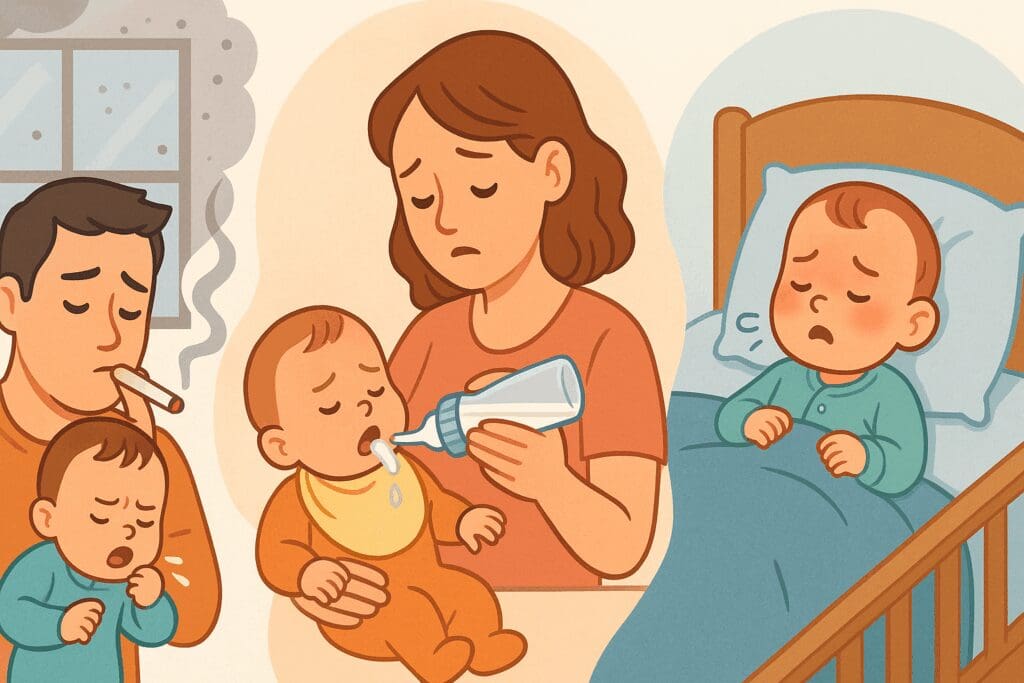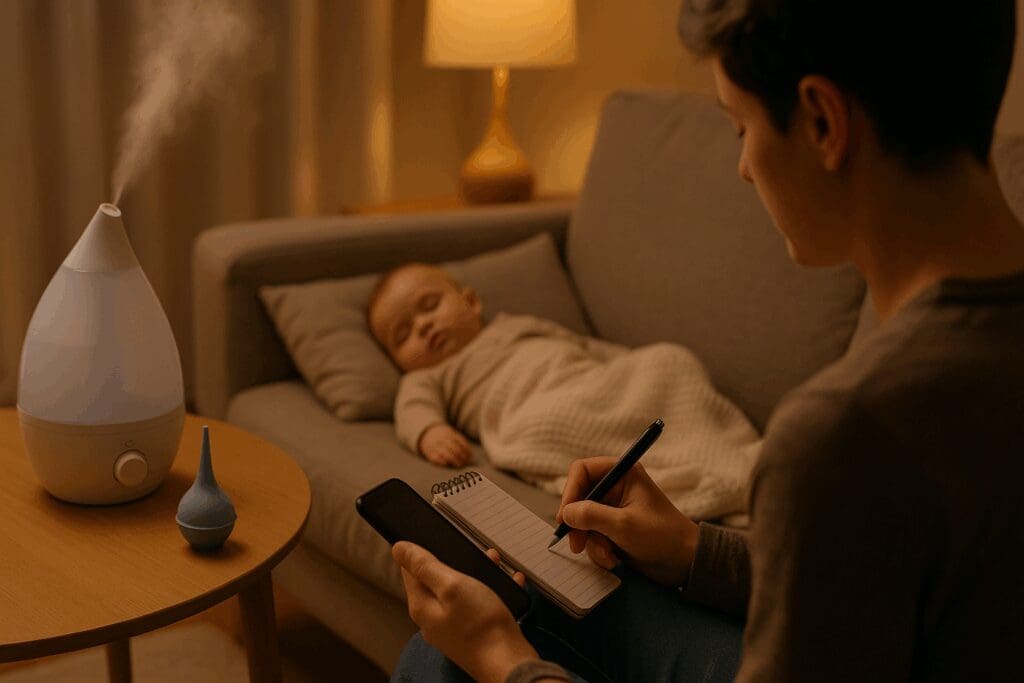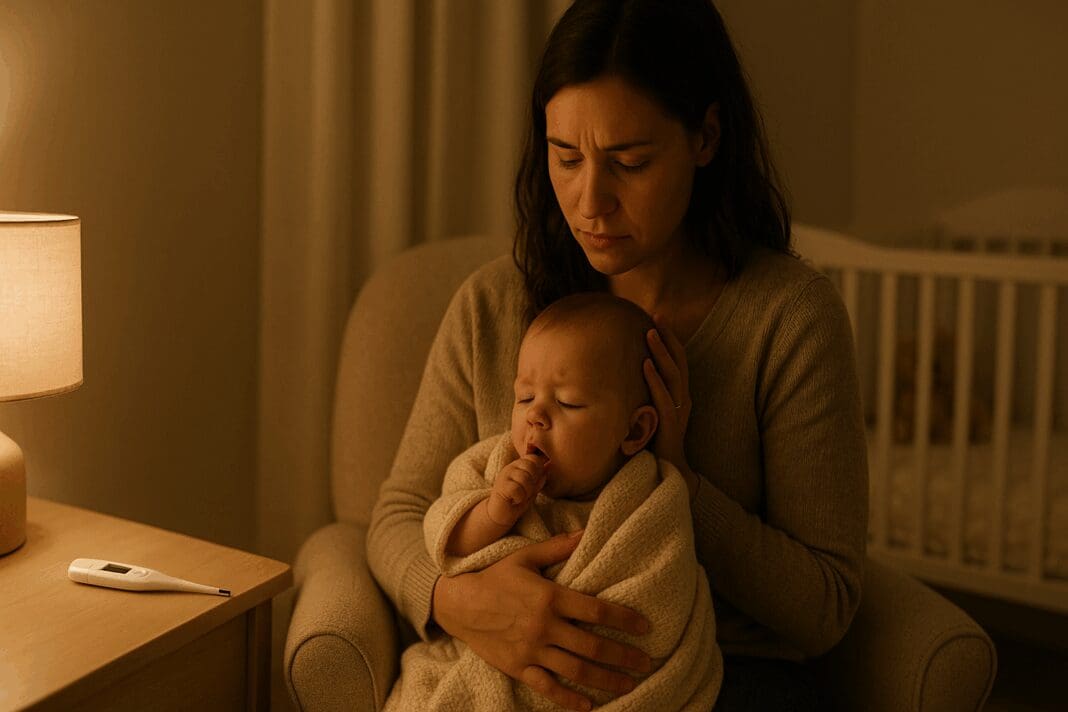Coughing in infants is a common concern among new parents, and understanding when to take baby to doctor for cough is essential to ensuring your child’s well-being. While many coughs are mild and caused by temporary irritants or viral infections, others can signal more serious health issues requiring prompt medical attention. The challenge lies in distinguishing between a harmless cough and one that may indicate a deeper respiratory or systemic issue. This article offers a comprehensive guide for parents navigating this uncertainty, emphasizing the importance of knowledge, observation, and timely intervention in protecting a baby’s health.
You may also like: Essential Baby Care and Maternity Tips Every First Time Parent Needs to Know

Understanding the Nature of Infant Coughs
Infant coughs can vary significantly in sound, frequency, and severity, each type offering clues about its underlying cause. Some coughs may be dry and hacking, often the result of minor irritation or viral infections like the common cold. Others might be wet or productive, suggesting the presence of mucus in the respiratory tract, potentially pointing to more complex infections such as bronchiolitis or pneumonia. Barking coughs, frequently caused by croup, are typically accompanied by noisy breathing and occur more often at night, causing distress for both child and caregiver.
The immature immune system of babies makes them more susceptible to respiratory infections. Moreover, infants are obligate nasal breathers for the first few months of life, which means even minor congestion can lead to difficulty breathing and feeding. Parents may notice that what seems like a mild cough during the day worsens at night or after feeds, exacerbating symptoms and discomfort. Observing patterns in your baby’s cough—its timing, associated symptoms, and any triggers—is key to understanding whether the cough is part of a mild viral illness or a sign of a more serious issue.

Common Causes of Cough in Babies
Viral infections are the most frequent cause of coughs in babies. Respiratory syncytial virus (RSV), the influenza virus, and parainfluenza are among the primary culprits. These infections often present with other symptoms such as fever, nasal congestion, and reduced appetite. RSV, in particular, is a common cause of bronchiolitis in infants and can lead to severe respiratory distress, especially in babies under six months old.
In addition to viral infections, environmental irritants can provoke coughing in infants. Exposure to tobacco smoke, dust, or strong odors may irritate a baby’s airways, triggering a reflexive cough even in the absence of infection. Reflux, where stomach contents back up into the esophagus, can also cause a chronic cough in babies. Gastroesophageal reflux disease (GERD) may be suspected if the cough coincides with feeding or lying down, accompanied by frequent spit-up or discomfort.
Occasionally, a persistent or sudden onset cough may be due to inhalation of a foreign object, such as a small toy or piece of food. These cases are medical emergencies and require immediate attention. Understanding these varied causes helps parents recognize that not all coughs are created equal, and some may need urgent evaluation.
Critical Symptoms That Warrant Immediate Medical Attention
While many infant coughs resolve on their own, certain symptoms indicate the need for urgent medical care. Difficulty breathing, characterized by rapid breathing, flaring nostrils, grunting, or visible retractions (sucking in of the skin between ribs), suggests the baby is struggling to get enough air. Any sign of respiratory distress should prompt an immediate visit to the doctor or emergency room.
Blue or dusky coloring around the lips, tongue, or fingertips is another red flag, signaling inadequate oxygenation. This can occur during severe coughing episodes or indicate a more serious underlying respiratory or cardiac issue. In addition to breathing changes, a high fever (over 100.4°F or 38°C in babies under three months) accompanied by lethargy, irritability, or poor feeding should never be ignored.
Another symptom that raises concern is a cough that persists for more than ten days without improvement or worsens after initially getting better. This pattern could suggest secondary bacterial infection or complications like pneumonia. Parents should also watch for coughing fits that lead to vomiting, especially if they are frequent or severe, as these may indicate pertussis (whooping cough), which is particularly dangerous for infants who are not yet fully vaccinated.
When to Take Baby to Doctor for Cough: Age-Specific Considerations
Determining when to take baby to doctor for cough often depends on the child’s age, as younger infants are more vulnerable to complications. Babies under three months old should be evaluated by a healthcare provider for any cough, regardless of severity. Their respiratory systems are not fully developed, and even minor infections can escalate quickly. Additionally, their symptoms may be subtle, requiring clinical assessment to rule out serious issues.
For infants aged three to six months, a cough accompanied by fever, changes in breathing, or difficulty feeding warrants medical attention. Although slightly more robust than newborns, babies in this age group still have limited immune defenses. Parents should also monitor for decreased urine output, which can indicate dehydration, especially if the baby is not feeding well due to illness.
Older infants, between six and twelve months, can often fight off mild respiratory illnesses on their own, but persistent coughing, wheezing, or a decline in activity level should not be ignored. If the baby appears unusually tired, disinterested in play, or less responsive, it could indicate that the cough is taking a toll on their energy levels and overall health. Timely medical intervention can prevent complications and provide relief for both parent and child.

How to Monitor Infant Coughs at Home
Monitoring a baby’s cough at home requires attentive observation and a calm, structured approach. Parents should keep a record of when the cough occurs, its duration, and any associated symptoms such as fever, congestion, or changes in breathing. Note whether the cough is dry, wet, barking, or whooping in nature, as this can provide critical clues for healthcare providers.
Using a humidifier in the baby’s room can help ease coughs caused by dry air, especially during winter months. Saline nasal drops followed by gentle suctioning with a bulb syringe can relieve nasal congestion, making it easier for the baby to breathe. Maintaining hydration is also crucial. Offer frequent feedings to ensure the baby is getting enough fluids, which can help thin mucus and reduce coughing.
Parents should also create a smoke-free, dust-free environment, as airborne irritants can worsen respiratory symptoms. It is essential to avoid over-the-counter cough medications unless explicitly recommended by a pediatrician. These medications are generally not safe or effective for infants and may mask symptoms that need medical evaluation.
The Role of Pediatric Checkups in Respiratory Health
Regular pediatric checkups are vital for maintaining a baby’s respiratory health and catching potential issues early. During these visits, doctors assess the baby’s growth, developmental milestones, and perform thorough physical exams, including listening to the lungs and heart. These routine evaluations provide an opportunity to address any concerns about coughs or other respiratory symptoms.
Pediatricians can also offer guidance on preventive measures such as vaccinations. Immunizations against influenza, pertussis, and RSV (in eligible infants) can significantly reduce the risk of severe respiratory infections. Parents should stay up to date with their baby’s vaccine schedule and consult their pediatrician about any additional protective strategies during cold and flu season.
In addition, checkups are an opportunity to discuss environmental factors and lifestyle choices that may impact the baby’s respiratory health. Pediatricians can offer personalized advice on indoor air quality, feeding practices, and safe sleeping environments, all of which contribute to a healthy respiratory system and reduce the likelihood of persistent or severe coughs.

When to Take Baby to Doctor for Cough: Evaluating Breathing Patterns
Breathing patterns offer critical insight into whether a baby’s cough is cause for concern. Parents should observe whether the baby is breathing faster than usual, struggling to catch their breath, or using extra muscles to breathe. These signs may indicate respiratory distress and necessitate immediate medical evaluation.
Wheezing, a high-pitched whistling sound during breathing, often suggests narrowing or obstruction of the airways and is commonly associated with conditions like bronchiolitis or asthma. While asthma is rare in infants, wheezing can still be a sign of viral infection or allergic reaction. Stridor, a harsh vibrating noise heard when inhaling, may indicate upper airway obstruction, such as that caused by croup.
Parents should trust their instincts when something seems off with their child’s breathing. Babies often exhibit subtle signs of respiratory compromise before more obvious symptoms appear. If a baby suddenly stops playing or interacting and appears focused on breathing, it’s time to seek medical advice. By closely monitoring respiratory effort and behavior, parents can make informed decisions about when professional intervention is necessary.
Strategies for Easing Mild Coughs at Home
When dealing with a mild infant cough that is not accompanied by concerning symptoms, there are several effective home care strategies that can provide comfort and support recovery. One of the most helpful measures is ensuring that the baby remains well-hydrated. Fluids help thin mucus, making it easier to expel and reducing the frequency and intensity of coughing fits.
Creating a soothing sleep environment can also promote healing. Elevating the head of the crib slightly—under medical guidance—can improve drainage of nasal secretions and reduce nighttime coughing. Additionally, warm baths can offer temporary relief by loosening mucus and calming the baby. Gentle chest rubs using approved baby-safe balms may offer additional comfort.
Maintaining a clean, allergen-free space is essential. Vacuuming frequently, washing bedding in hot water, and using air purifiers can help reduce dust mites and other irritants. If the cough is related to a known trigger such as pet dander, taking steps to limit exposure can prevent future episodes. While home remedies can be effective for mild symptoms, they should never replace medical care when warning signs appear.
When to Take Baby to Doctor for Cough: Recognizing the Tipping Point
There is often a fine line between a manageable cough and one that requires medical intervention. Knowing when to take baby to doctor for cough involves recognizing when symptoms shift from benign to potentially serious. A sudden change in the sound or frequency of the cough, new onset of fever, or a decline in feeding and alertness may indicate progression of the illness.
Babies who begin to refuse feedings, sleep excessively, or become difficult to console may be exhibiting early signs of systemic infection or respiratory compromise. If a cough begins to interfere with daily routines, disrupts sleep consistently, or appears to be worsening despite home care measures, it is time to consult a healthcare provider.
Parental intuition plays a powerful role in these decisions. If something feels wrong, even in the absence of clear symptoms, it is better to err on the side of caution. A thorough examination can offer peace of mind and ensure that the baby receives appropriate care promptly. Recognizing the tipping point and acting swiftly can significantly improve outcomes and prevent complications.
Preventive Measures and Long-Term Respiratory Wellness
Preventing coughs in babies begins with a strong foundation of hygiene, nutrition, and environmental care. Frequent handwashing, limiting exposure to sick individuals, and disinfecting common surfaces can greatly reduce the risk of viral infections. Breastfeeding, when possible, provides antibodies that bolster the baby’s immune system and offer protection against many common illnesses.
Ensuring proper indoor air quality is equally important. Avoiding smoking indoors, using high-efficiency particulate air (HEPA) filters, and maintaining optimal humidity levels can help prevent respiratory irritation. Parents should also be mindful of seasonal allergens, mold, and household cleaning products that may trigger respiratory reactions in sensitive infants.
Long-term wellness also involves staying current with pediatric appointments and developmental screenings. Discussing concerns about recurring coughs, environmental triggers, or family history of asthma with your pediatrician can lead to early interventions and tailored care plans. Creating a health-conscious home environment empowers families to proactively support their baby’s respiratory health from the start.
When to Worry About Infant Cough: Putting It All Together
Understanding when to worry about infant cough is not always straightforward, but combining observational awareness with medical knowledge helps parents make confident decisions. Coughs that persist beyond a week, worsen over time, or are accompanied by high fever, poor feeding, or breathing difficulty should never be dismissed. Prompt evaluation can rule out serious conditions and guide appropriate treatment.
Parents should remember that not all coughing is harmful. In fact, coughing is a protective reflex that helps clear the airways of mucus, irritants, or foreign particles. However, when that reflex becomes prolonged or exaggerated, it can indicate that the body is struggling to cope. Learning the difference between a normal immune response and a concerning pattern is crucial.
Every baby is different, and individual factors such as age, birth history, and underlying conditions should always be taken into account. Open communication with your pediatrician, a proactive approach to health, and informed decision-making are the keys to keeping your baby safe and thriving.
Frequently Asked Questions: Infant Coughing Concerns and Parental Guidance
When to Take Baby to Doctor for Cough: Are Seasonal Changes a Factor?
Seasonal transitions, particularly during spring and autumn, can significantly influence respiratory health in infants. Shifts in humidity, pollen levels, and temperature can increase susceptibility to viral infections and trigger allergic responses that manifest as persistent coughing. Babies with a family history of asthma or allergies may react more strongly to these environmental changes. If a cough coincides with a seasonal shift and doesn’t resolve within a few days or is accompanied by wheezing, it may be time to consider when to take baby to doctor for cough evaluation. Parents should also be mindful of regional air quality alerts, as even short-term exposure to pollutants during seasonal fluctuations can exacerbate infant coughing episodes.
How Can Infant Coughing Affect Breastfeeding or Bottle Feeding Habits?
Persistent coughing can interfere with feeding by disrupting the baby’s ability to coordinate sucking, swallowing, and breathing. This is especially concerning in infants who are already struggling with weight gain or have reflux issues. Frequent interruptions during feeds can lead to incomplete nutrition intake, increased fussiness, and even aversion to feeding times. When to worry about infant cough becomes particularly relevant in this context if the baby begins to refuse the breast or bottle altogether. Seeking early pediatric advice helps ensure proper feeding strategies are implemented, such as pacing techniques or repositioning, to support nutrition despite ongoing symptoms.
Can Certain Baby Products Contribute to a Worsening Cough?
Yes, certain baby products, especially those with strong fragrances or chemical additives, can irritate a baby’s airways. Common culprits include scented laundry detergents, room sprays, air fresheners, and even some lotions marketed for infants. These products may seem harmless but can provoke coughing spells in babies with sensitive respiratory systems. When to take baby to doctor for cough may come into sharper focus if symptoms worsen in specific environments or after the introduction of a new product. Parents are encouraged to switch to hypoallergenic and fragrance-free options and to monitor for symptom improvement following these changes.
When to Worry About Infant Cough: Could It Be Related to Silent Reflux?
Silent reflux, unlike classic gastroesophageal reflux, does not always present with visible spit-up, making it harder to detect. It can, however, lead to frequent throat clearing, coughing (especially after feeds), and even hoarseness or chronic nasal congestion. Since symptoms are subtle and mimic those of upper respiratory infections, parents may overlook reflux as a cause of chronic cough. Recognizing when to worry about infant cough in these cases involves identifying recurring patterns, such as worsening symptoms after meals or nighttime coughing without other cold symptoms. A pediatric consultation can confirm the diagnosis and suggest strategies such as smaller, more frequent feedings or positional therapy.
Are There Genetic Factors That Can Make a Baby More Prone to Chronic Cough?
While most infant coughs stem from infections or irritants, genetic predispositions can influence the frequency and severity of symptoms. Children with a family history of asthma, cystic fibrosis, or chronic bronchitis may be more likely to develop persistent coughs even in infancy. Although such conditions may not manifest fully until later in childhood, early signs can include recurrent coughing, wheezing, and poor response to standard treatments. In these cases, deciding when to take baby to doctor for cough may involve a more proactive approach, including referrals to pediatric pulmonologists or genetic testing. Recognizing family patterns and communicating them to your healthcare provider can facilitate earlier diagnosis and intervention.
What Role Does Infant Immunity Play in Cough Duration and Severity?
A baby’s immune system is still developing, especially in the first six months of life. This immaturity makes them more vulnerable to infections and may also delay recovery compared to older children. Factors such as premature birth, lack of breastfeeding, and limited exposure to environmental microbes can all influence immune resilience. When to worry about infant cough becomes particularly relevant for babies with known immune challenges, as even common colds may progress to more serious conditions like pneumonia. Ensuring timely vaccinations, promoting immune-supportive nutrition, and maintaining a clean but not sterile environment can all support the development of a robust immune system.
How Do Travel and Public Exposure Influence Decisions on When to Take Baby to Doctor for Cough?
Travel, especially air travel or visits to crowded public spaces, increases a baby’s exposure to unfamiliar pathogens. Changes in air pressure and low humidity on airplanes can also dry out the nasal passages, leading to irritation and subsequent coughing. When symptoms develop shortly after travel or public outings, it’s important to closely monitor for escalation. Knowing when to take baby to doctor for cough in these cases involves observing whether symptoms stabilize within 48 hours or if they worsen despite home care. Parents should also consider scheduling a pre-travel pediatric visit to discuss preventive measures, including vaccines and travel-specific hygiene strategies.
Can Teething Be Mistaken for a Coughing Illness?
Teething can cause increased drooling, which may lead to occasional coughing or throat clearing. However, it rarely causes a sustained or severe cough on its own. The confusion often arises when teething coincides with the onset of mild viral infections, leading parents to attribute all symptoms to teething. Distinguishing between these two scenarios is essential when deciding when to worry about infant cough, as persistent or worsening symptoms likely indicate a concurrent illness rather than just teething discomfort. Monitoring for signs like fever, sleep changes, or nasal congestion can help clarify the cause and guide the need for medical attention.
When to Take Baby to Doctor for Cough: Should Parents Be Concerned About Nighttime Symptoms?
Nighttime coughing can be particularly distressing for both baby and caregiver, often disrupting sleep and signaling potential respiratory compromise. Gravity during sleep can worsen postnasal drip, making a cough more prominent even when the baby seems fine during the day. However, consistent nighttime coughing, especially when accompanied by labored breathing or waking episodes, can be a sign of asthma, allergies, or early respiratory infection. Understanding when to take baby to doctor for cough that worsens at night involves evaluating whether sleep is consistently interrupted and if other symptoms—like wheezing or fever—emerge. A pediatric assessment can rule out chronic conditions and recommend targeted therapies for nighttime symptom relief.
When to Worry About Infant Cough: What Are the Psychological Effects on Parents?
Persistent infant coughing doesn’t just affect the child; it takes a profound emotional toll on caregivers. Parents may experience heightened anxiety, sleep deprivation, and feelings of helplessness, particularly if they’ve already sought medical advice but symptoms persist. This ongoing stress can strain relationships and contribute to parental burnout, especially in households with limited support. When to worry about infant cough includes not only the baby’s symptoms but also the mental well-being of the parents. Seeking mental health support, joining parenting forums, or even arranging respite care can offer much-needed relief and perspective while continuing to advocate for your baby’s health.
Conclusion: Trusting Your Instincts and Knowing When to Act
In the intricate world of baby care essentials and maternity health, few challenges test a parent’s instincts and judgment like a coughing infant. While many coughs are short-lived and harmless, knowing when to take baby to doctor for cough is a skill rooted in attentiveness, education, and trust in your own intuition. Observing your baby’s symptoms, understanding age-specific vulnerabilities, and maintaining open lines of communication with healthcare providers empower you to make timely and effective decisions.
Medical professionals offer critical insight and diagnostic support, but no one knows your baby better than you. If you notice subtle changes in behavior, feeding, or breathing, even in the absence of dramatic symptoms, it is worth seeking guidance. Early intervention can prevent complications and provide reassurance during a stressful time.
Ultimately, recognizing the balance between home care and professional attention is a vital component of responsible parenting. By internalizing the key warning signs and maintaining a proactive stance on respiratory health, parents can ensure their babies receive the care they need when they need it most. In doing so, you not only address immediate concerns but also lay the groundwork for a lifetime of health-conscious caregiving.



